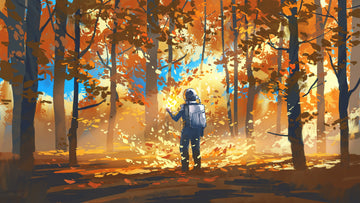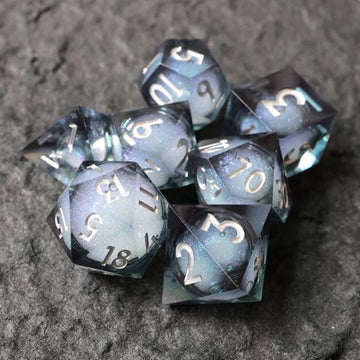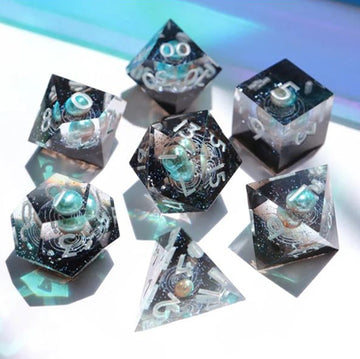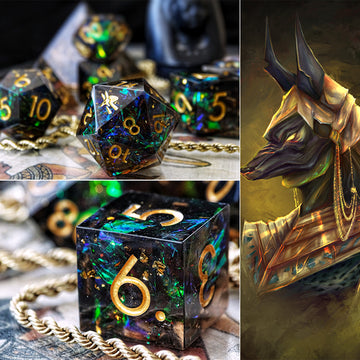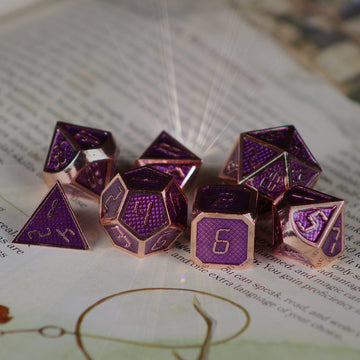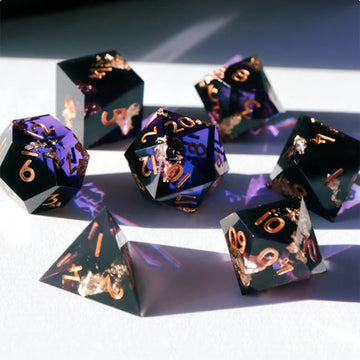The Psychological Keys for Creating Amazing Exploration Encounters
By Riley Rath
Table of Contents
Introduction
Exploration and Discovery
-
Discovery and D&D
Fear of the Unknown
-
Stoking Player Anxiety
The "Good Unknown": Curiosity
-
Encouraging Curious Exploration
Conclusion
In the first post in our series on the exploration pillar of D&D, I claimed:
"Exploration is the most unique and enchanting part of Dungeons and Dragons."

It's a bold, hot take. One that requires some additional explanation, because our experience doesn't match it. Every table has a meta-gamer who aches to show off in combat. And everyone has a thespian friend who delights in role-playing with every NPC. But when was the last time your players begged for more exploration?
But notice, I did NOT say "your favorite," "the best," or "the most fun."
The claim is that exploration has the most potential to create a "uniquely enchanting experience," something distinct from combat and social encounters, as well as most other forms of games. And most of us are missing out.
I have not budged from that position, and astronaut Frank Borman states the reason why:
"Exploration is the essence of the human spirit."

Now, I am sure some philosophers, poets, politicians, and priests... and hey, why not plumbers... may have something else to say about what is essential for the "human spirit."
But you can't argue that there is something unique about exploration. Something about it resonates deep down within us, calling us out of our comfort.
- Whether we are in the wild expanse of Yosemite or in grandma's small, dusty attic, exploration is exhilarating.
- It sparks our imagination, and can easily shift from merely capturing our attention to becoming an obsession.
- The impulse to explore is childlike, and is considered a treasure when rediscovered in adulthood.
Which begs the question: where does that powerful, mysterious drive to explore come from? And is it present in our D&D 5e adventures?
Humanity LOVES exploration for psychological reasons.
What's strange about exploration is that, more often than not, it is not necessary. And what is even stranger is that humans (and player characters) will explore EVEN IF it comes with great personal risk!
In this post, we are going to address WHY exploration is unique, enchanting, and fun:
- We are going to talk about the ideas and emotions that are a part of exploration... things like "discovery," "the unknown," and "curiosity."
- We are going to show that these things are relevant for exploration in your tabletop games.
- And we are going to offer suggestions to help make your D&D exploration come ALIVE.
The hope is that this post will reveal the special experience exploration offers and inspire you to incorporate more exploration in your D&D campaigns.
Exploration and Discovery
First thing's first. Let's all get on the same page as to what exploration actually IS:
Exploration is seeking, investigating, wandering... out of a desire to discover something (learn more about exploration here).

Additionally, exploration almost always involves some movement. Even if someone is "exploring their own soul" in the stillness of the lotus position, they are still traveling about the rooms/chasms of their own consciousness.
But movement isn't the most important part of exploration... DISCOVERY is.
A discovery is almost always new knowledge. That knowledge can be an idea, location, new resource, threat... anything. If the explorer finds the knowledge important enough to be worth exploring, it works.
Let's use an Indiana Jones-esque forbidden jungle temple as an example.

An explorer can desire to discover:
- A WAY through the jungle
- The LOCATION of a lost city in the jungle
- The BEAUTY of a statue in the lost city
- The EXISTENCE of a tomb underneath the statue
- The PRIZE of a golden idol in the tomb
And DESIRE is the other key word here. Because explorers struggle mentally and physically as they search, and once they discover what they have been searching for, they are relieved... excited... joyful... accomplished.
The "discovery" part of exploration feels damn good!

Ok, so adventurers have realized, desired, explored, and discovered. Now comes a choice... they can either:
1. Face any challenge that awaits them at the discovery
2. Continue to explore
3. Find a way to benefit from their discovery
But notice that the exploring ENDS with the discovery. They can continue exploring, but once they have arrived at THE discovery, the "exploration encounter" (to use D&D terms) ends, and a new one begins.
This is what a lot of campaigns get wrong about exploration.
Let's look at your own campaigns. Many-a-party has explored a dungeon for a treasure chest of gold and jewels. And once they finally discover the one that is not a mimic (and heal their missing limbs), they are supposed to rejoice at having found the treasure.

But here's the problem:
For the majority of players, the discovery doesn't satisfy desire.
They desire the gold and jewels, but they do not really DESIRE to DISCOVER the gold or jewels. More often than not, the players are just eager to use the treasure to buy equipment: weapons, armor, spell components (etc). Or perhaps they are going to return it to a local lord to move the plot along.
But they aren't excited by the discovery, they are only eager to get the stuff the gold and jewels provide them. Which means they are missing out on the number one thing that makes exploration great.
If your discovery is just a means to an end... exploration will be a BORING chore.
Yes, every explorer wants what they are seeking so they can do something with it, but the act of discovery itself is the climax of the exploration "encounter." The discovery IS an emotional reward.

What am I getting at here?
My point is that exploration is about more than resource acquisition. It is emotional, not just physical. And while the results of gold motivate murderhobos, that is not the only reason why they, or any D&D party, explores. Neuroscience has proven what psychologists have known for ages: we are motivated by more than gold.
What does this means for our exploration encounters in our D&D campaigns?
Players need to find DISCOVERY itself fun; they need to DESIRE discovery.
If players are irritated with exploration because it keeps them from the benefits they want, they are going to have a pretty miserable time exploring. And exploration will continue to remain a forgotten pillar: ignored and neglected.
But if the players find discovery to be satisfying and celebratory, then exploration will finally find its rightful place in your campaigns.
So what makes us actually "desire discovery"? And how do you stir that desire in your players? And what makes that process fun?
There are two main forces that motivate us to explore: the unknown and curiosity, to which we now turn...
The Fear of the Unknown
So exploration is all about discovery. And not to insult your intelligence by stating the obvious, but when we discover something the unknown becomes known.
Discovery is the transition from uncertainty to certainty.
But the type of uncertainty needed for exploration ain't any ol' uncertainty. After all, there are lots of things we are uncertain of... how many arrows were fired at Agincourt... how black holes work... what the fox says. But despite not knowing these things, we go about our lives all hunky-dory... ignorance is bliss!
No... for uncertainty to spur us to explore, we need to be CONSCIOUSLY AWARE that we do not know something IMPORTANT.

Humans react when we know for a fact that we are in the dark about something, especially if we know that "something" could impact us negatively. In short, it makes us uncomfortable.
Ours brains REALLY prefer the known to the unknown.
- There is something unknown...
- We realize we do not know it...
- We do not like how that makes us feel...
- So we explore...
- We discover things...
- And the unknown becomes known.
Why do we do this? Why are our brains so bothered by not knowing stuff?
The general consensus (among actual smart people) to explain this phenomena is that the "fear of the unknown" is an evolutionary survival tactic buried within our DNA. In order for ancient ancestors to survive all sorts of threats, it was safer to treat every unknown as a potential threat.

Think waaaaaaaaaaaaaaaaaaaaaaay back in the day... like caveman days. People died if they ate the wrong berries, or didn't know how to control a fire, or couldn't escape a saber-tooth tiger. You don't know what to do = you mess up = good chance you die. Fear of death led to fear of the unknown.
A primal fear within humans is the fear of the unknown.
So rather than living in abject terror, waiting for life and death situations, we developed a system to help us survive: we learned to imagine alternative states of reality. We would think about the future and the bad stuff that could happen and make plans to deal with it. That way we would be prepared and wouldn't be "flying blind" in a potentially dangerous situation.
Knowing more stuff that could happen made life safer.
However, educated guessing can only take us so far. Eventually each of us realize that the way we see the world isn't quite how the world works. And to make matters worse, we also realize that our previous knowledge in inadequate for helping us deal with it.
So what does our brain do? Does it say "Oh dearie me, that is unfortunate, but surely we shall be fine... no use getting worked up or going through all the effort to deal with it..."
Nope.
Our brains use ANXIETY to force us to explore.
Why? Because our brains, programmed to help us survive, DEMAND that we go out and get new knowledge to help us cope with whatever threat may be out there. Here is how anxiety fits in:
- Our brain fills us with anxiety
- Which we want to relieve
- So we explore and discover if the unknown thing we fear is actually threatening
- Then we adapt to survive
- The brain makes the anxiety go away

Strangely enough, even if we discover something terrible in exploration, our brains are satisfied! The known is always more comforting than the unknown.
Which feels super weird, and shocks psychologists over and over again when it comes up in social experiments. Studies have shown that people, when they know something bad is going to happen, experience more suffering before they know what the bag thing is. For example, one study showed people would rather wait 7x longer for a train they KNEW was coming on time.
Uncertainty causes a negative affect to become more negative.
Consider your own life...
Have you ever gripped your phone, waiting for someone to type out a text when you KNOW something is wrong?
Or get an ominous email from a boss, asking to meet at 4:30pm?
Or grew nervous as a DM gives clues of some hideous monster lurking about the forest?
Exactly... TERRIFYING. And we can't help imagining what terrible things may be in store for us. It is programmed into our DNA for our brains to act this way. And this anxious uncertainty motivates exploration.
Here are the three takeaways about "unknown/known" for DMs and D&D players:
1. Make sure your players know they do not know something

As stated above, the players can't be ignorant. You have to let them know that A) there is something that they do not know, and B) for better or worse, it is in their best interest to know that thing.
There are several ways you can let them know they do not know something.
- You can sow seeds of doubt in a plan they make, mentioning the chaos of both the world as well as the dice (probability).
- You can offer multiple sources of conflicting information, causing them to question the reliability of what they know (ambiguity, ex: a villager saying that their local troll is not impacted by fire).
- You can identify the complexity of a situation, telling them several potential, vague outcomes if they do something... or do nothing (complexity).
2. Make them FEAR the unknown

Once you demonstrate that they are uncertain about something bad... you can stoke their fears. Fill them with anxiety so that they are motivate to relieve that anxiety and fear.
Say they need to rescue someone from a castle. Well, what if you drop hints that if they try to sneak into the castle, they will surely have their souls possessed? What do you think your players will do?
You can be DAMN sure they are going to explore and discover how to survive.
They will have "anxious uncertainty" and talk to everyone in town. They will try to disguise themselves and wander the castle grounds. They will befriend the Lord's son. And when they finally do realize that the wraiths are invisible EXCEPT under a full moon (or something like that), the DISCOVERY itself will be satisfying because it relieves them of anxiety.
And because there is so much at stake, they will have a ton of fun doing it.
3. Don't Make the Unknown TOO Scary

Fear of the unknown is good and all, but you have to walk a fine line. You can't have them too afraid of what might happen. You gotta baby bear it... not mama bear or papa bear.. find juuuuuuuust the right spot.
For example, if you say "that random tower on the hill kills everyone that goes in," your players are going to resolve their anxiety in an obvious way: they just won't go in the tower!
Fear and anxiety is not a good adventure hook for anything unnecessary to plot or character development.
It is also not a good motivator if they assess that the thing they fear is IMPOSSIBLE to overcome. Many sailors sign up to sail across the ocean, but few would sign up to sail through a hurricane.
If the unknown is TOO scary, or exploring the unknown TOO dangerous, then they will probably banish those scary thoughts rather than deal with them.
But if the players are not held back by an intolerable fear... the OTHER motivation for exploration can take over... CURIOSITY.
The "Good Unknown": Curiosity

So the tricky thing is... the unknown isn't always bad... it doesn't only stir up anxiety...
For example, think of the many activities that are only enjoyable because there is uncertainty:
- Why did people INSIST you not spoil episodes of Game of Thrones?
- Would blackjack be fun if you always knew what cards the dealer had?
- Does anyone reeeeaaally enjoy sports when they know how the game ends?
- Can a murder mystery be a good read if you always know who the killer is?
- How would D&D feel if you always knew what you would roll?
Uncertainty about positive things creates positive feelings.
This goes beyond entertainment. In one study, participants were told about two gifts that would be given after a short waiting period. One group was not told which gift they would receive, and the other group was told that they would receive BOTH gifts.
Guess which group had a better time waiting?
Shockingly, the ones who were UNCERTAIN about what they would receive! Not knowing the good outcome, and imagining the outcome, turned out to be really, really FUN!
Like anxiety, not knowing causes the brain to overthink. But since it is a good thing the brain is thinking about, the overthinking feels good AND makes the pleasure of the discovery much greater.
The name of this "activity of fun uncertainty" is CURIOSITY.

Image does not belong to Awesome Dice
Literally, curiosity is having a strong desire to learn or know something. It's an internal, emotional urge to learn what one does not know.
And it comes in a lot of forms. Sometimes we are curious about what we will get for Christmas (epistemic curiosity). Other times we get curious because we are bored (diversive curiosity). And sometimes we are annoyed by our ignorance and want to fill in the gaps (specific curiosity).
Curiosity is enjoying the uncertainty of a future good discovery.
And while curiosity looks different for every person, it is nevertheless a part of every person. Why? Because, once again, CAVEMAN BRAINS.

Turns out, our brains didn't just give our pre-human ancestors negative emotions to get them exploring/surviving! Once the caveman was exploring, and discovering things, the brain would positively reinforce the action by providing a little more dopamine (the "happy" chemical) as a reward.
And when the caveman was at peak curiosity, the trickle of dopamine would be more like a wave. Modern scans of brain waves show that satisfying one's curiosity is comparable to having good food, good wine, or good sex.
Satisfying your curiosity feels really, REALLY good.
As humans, once we are given juuuuuust enough info to know there is SOMETHING good out there... just waiting for us... an insatiable curiosity rises from within us, forcing us to explore.
Overcome with curiosity, the goal of the discovery captures AND holds our attention, engaging us far beyond our normal attention span. It also turns mere delayed gratification into an enjoyable experience from beginning to end.
But it goes even farther than that. Curiosity causes us to take risks we never otherwise would take for the sake of discovery! It motivates us to push through our limits when we are exhausted and overwhelmed.
Curiosity is ESSENTIAL for exploration.
To summarize, here is how curiosity works with exploration.
- When a person knows there might be something good out there
- But they don't know exactly what it is
- Curiosity motivates them to explore
- The time before the discovery, they imagine and focus on the good thing, which makes the exploration enjoyable
- And the discovery itself, when their curiosity is satisfied, is VERY enjoyable.
Long story short: curiosity can possess us like a spell. It is THE energy and impetus for exploration, both throughout human history... and in your D&D campaigns.
If curiosity and exploration are bound together, then you will need to create and sustain player curiosity in your games. Here are some suggestions:
1. Use Curiosity to Tempt Your Players

Tell me if you've heard this one: the Dungeon Master reveals a mission so intriguing players can't help but find out more. Players slowly learn how dangerous it is but are too curious to say no. Sound familiar? Yep, because it's just an "adventure hook": straightforward, simple, and widespread.
Doesn't matter if the good thing is a character reveal, or level up, or gold, or a particularly cool encounter. The trick is to make the hook so damn good that the players known risks pale in comparison to the reward.
The temptation of a great prize will bring the curiosity out of them and, at the very least, cause them to learn a little bit more...
2. Let Players Know They Are CLOSE

When we are curious, our unknowing feels good because we fixate on the reward. However, you can't dangle potential rewards forever...
The longer players have to wait, the less fun curiosity becomes. Eventually, their focus will shift from "the reward" to "the waiting." And the waiting is NOT fun. Curiosity may be strong, but it's impatient.
So make sure you do not test their patience when using curiosity during an exploration encounter. You accomplish this two ways:
1. Continue to give them clues: Curiosity/discovery is about knowledge... so don't wait to give them all the information they need at the end. Reward their curiosity a little bit at a time, a taste of the satisfying discovery that is to come.
2. Encourage them to keep going: Find ways in your descriptions to let them know they are SO CLOSE to reaching their goal, or at the very least getting closer. Always make it feel like their discovery is JUST out of arm's reach. That "I'm so close..." feeling is pleasantly torturous... and way better than players yawning out of boredom!
3. Have Answers to Player Questions

Speaking of "continuing to give them clues"... you need to have information you can give your players. And I'm not talking about exposition dumps or nonsense filler... I'm talking valuable, interesting information.
Because when you provide good adventure hooks and you encourage them by letting them know they are close, you are driving the encounter forward. But eventually they're own curiosity will catch up and snatch the reigns from your hands.
A big way players fuel their curiosity is by asking questions. The more curious they are, the more questions they will ask and the deeper those questions will be.
However, curiosity can be suppressed. As soon as an authority figure says, "You know everything, there is no reason to ask questions," curiosity vanishes. You can say this directly, but sometimes you say this without meaning to... when you stop having answers to their questions.
And I'll admit... this is hard for DMs, no matter what your session management style is. If you plan everything out ahead of time, you have to know your world and NPCs like the back of your hand. And if you improv everything on the spot, you have to have an inexhaustible well of creativity.
Unfortunately, I have no shortcut, trick, or cheat code. It is a learned skill, one we are all working on as DMs.
Conclusion
The designers of D&D 5e were right to include exploration alongside combat and social as the pillars to D&D 5e. I believe they noticed that discovery was essential to adventure, and that fear of the unknown and curiosity were powerful forces for gameplay AND storytelling.
But even more importantly... they make exploration FUN.
Exploration tugs at the human soul in a different way than combat and role-playing. Our brains have intolerance for the unknown and will go to great lengths to rid ourselves of ignorance.
Regardless of whether we fear something negative or are curious about something good... DMs can use these psychological forces to turn the whole exploration process into a unique and wildly entertaining experience.
In later posts, we will discuss HOW to make exploration more fun... how to travel, how to wander a forest, even how to pull a heist. We'll even offer examples from our own games. But for now, I'll finish with one final point:
Find the balance that works for YOUR table.
Some exploration is best driven by the fear of the unknown. Others by curiosity and a promise of reward. And sometimes a mix of the two is best.
Finding that balance depends on the encounter, campaign, and players at your table. It will definitely require some trail and error, as well as asking your players for feedback.
But eventually you'll find something that not only works for you, but adds a whole other amazing dimension to your tabletop adventures.
Curious About Upcoming Dice Releases?
Join Our Newsletter and Stay Updated
Get Just One Email a Month
Riley Rath

Riley is a freelance copywriter, content writer, and marketer based out of Spokane, WA. He is thankful to have the opportunity to combine his passion for imaginative role-playing to help FLGS, tabletop, board game, and D&D related businesses communicate their distinct value to players everywhere. When not playing or writing about board games or DnD, he is busy hiking, cooking, and gardening... very hobbit-like for a 6'4" dude.
DnD or Board Game Marketing Emergency? Check Out My Website!

